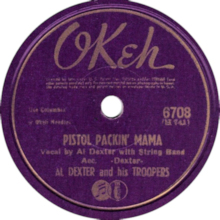
"Pistol Packin' Mama" was a "Hillbilly"-Honky Tonk record released at the height of World War II that became a nationwide sensation, and the first "Country" song to top the Billboard popular music chart. It was written by Al Dexter of Troup, Texas, who recorded it in Los Angeles, California on March 20, 1942, with top session musicians Dick Roberts, Johnny Bond and Dick Reinhart, who all normally worked for Gene Autry).
"Guitar Polka" is a 1946 instrumental song by Al Dexter and His Troopers. "Guitar Polka" spent sixteen weeks at number one on the Juke Box Folk charts and a total of twenty-nine weeks on the chart.
"Wine Women And Song" is a 1940 song written by Al Dexter and Aubrey Gass. It was recorded on April 23, 1940 at Burrus Sawmill Studio, Saginaw, Texas by Al Dexter & His Troopers. It was released June 6, 1940 on Vocalion 05572 with no success. After hits like "Pistol Packin' Mama", Dexter re-recorded it on April 5, 1945 at the CBS Studio at Radio Station KNX, Sunset Blvd., Hollywood, California. It was released on August 15, 1946 on Columbia 37062, backed with "It's Up To You". On September 14, 1946, it reached the no. 1 spot on Billboard's "Most Played Jukebox Folk Records" chart, where it remained for five weeks.
"(Remember Me) I'm The One Who Loves You" is a song written and originally sung by Stuart Hamblen, which he released in 1950. The song was a hit for Ernest Tubb the same year, and Dean Martin in 1965. Johnny Cash also covered it on his 1957 debut album Johnny Cash with His Hot and Blue Guitar!
"Honey, Do You Think I'm Wrong" is a country music song written by Al Dexter and Frankie Marvin, performed by Al Dexter and His Troopers, and released on the Columbia label. In February 1946, it reached No. 2 on the folk chart. It spent eight weeks on the charts and was ranked as the No. 12 record in Billboard's year-end folk juke box chart. It was the "B-side" to "Guitar Polka" which peaked at No. 1.

"Drivin' Nails in My Coffin" is a country music song written by Jerry Irby. It is a breakup song, telling of a man who has been drinking booze, "driving nails in my coffin over you."

"I Wish I Had Never Met Sunshine" is a country music song written by Gene Autry, Dale Evans, and Oakley Haldeman. It was sung by Gene Autry and released on the Columbia label. In May 1946, it reached No. 3 on the Billboard folk chart. It was also ranked as the No. 13 record in Billboard's 1946 year-end folk juke box chart.
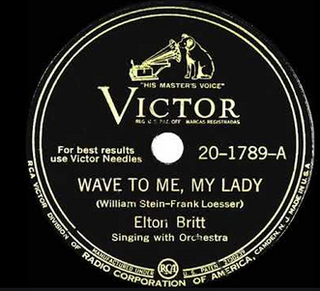
"Wave to Me, My Lady" is a country music song written by William Stein and Frank Loesser, sung by Elton Britt, and released on the RCA Victor label. In March 1946, it reached No. 3 on the Billboard folk chart. It was also ranked as the No. 22 record in Billboard's 1946 year-end folk juke box chart.
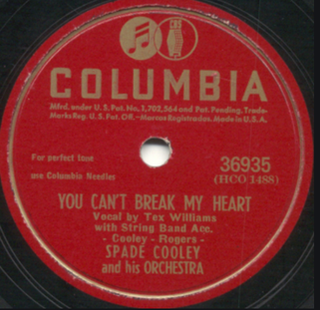
"You Can't Break My Heart" is a country music song written by Spade Cooley and Smokey Rogers, performed by Spade Cooley and His Orchestra, and released on the Columbia label. In April 1946, it reached No. 3 on the Billboard folk chart. It was also ranked as the No. 19 record in Billboard's 1946 year-end folk juke box chart.
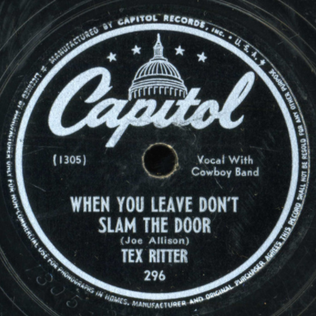
"When You Leave, Don't Slam the Door" is a country music song written by Joe Allison, performed by Tex Ritter, and released on the Capitol label. In October 1946, it reached No. 3 on the Billboard folk chart. It was also ranked as the No. 23 record in Billboard's 1946 year-end folk juke box chart.

"Silver Spurs " is a country music song written by Cindy Walker and Gene Autry, sung by Autry, and released in 1946 on the Columbia label. In February 1946, it reached No. 4 on the Billboard most-played folk chart. It was also ranked as the No. 27 record on the Billboard 1946 year-end folk record sellers chart.
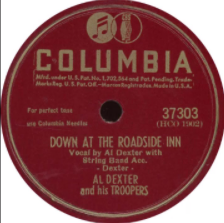
"Down at the Roadside Inn" is a song written by Al Dexter, performed by Dexter, and released in 1947 on the Columbia label. In May 1947, it peaked at No. 4 on the Billboard folk chart. It was also ranked as the No. 16 record on the Billboard 1947 year-end folk juke box chart.
The Billboard Most-Played Folk Records of 1946 is a year-end chart compiled Billboard magazine ranking the year's top folk records based on the number of times the record was played on the nation's juke boxes. In 1946, country music records were included on, and dominated, the Billboard folk records chart.

"Freight Train Boogie" is a country music song written by Alton and Rabon Delmore under the pseudonyms, Jim Scott and Bob Nobar. The song was recorded by The Delmore Brothers in Cincinnati. It was released in 1946 on the King label. In December 1946, it reached No. 2 on the Billboard folk chart. It was also ranked as the No. 30 record on the Billboard 1946 year-end folk juke box chart. Often the recording is reguarded as one of the first Rock and Roll recordings.

"That's How Much I Love You" is a country music song written by Arnold, Fowler, and Hall, sung by Eddy Arnold, and released in 1946 on the RCA Victor label. In October 1946, it reached No. 2 on the Billboard folk chart. It was also ranked as the No. 10 record on the Billboard 1946 year-end folk juke box chart.










